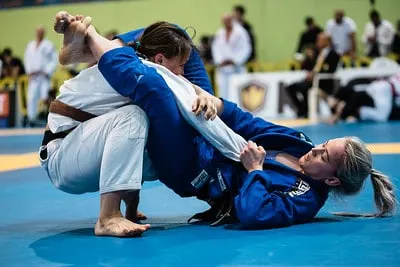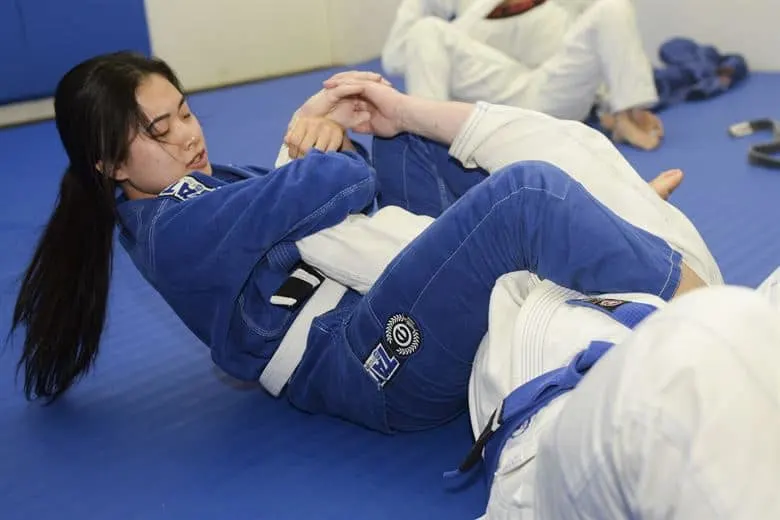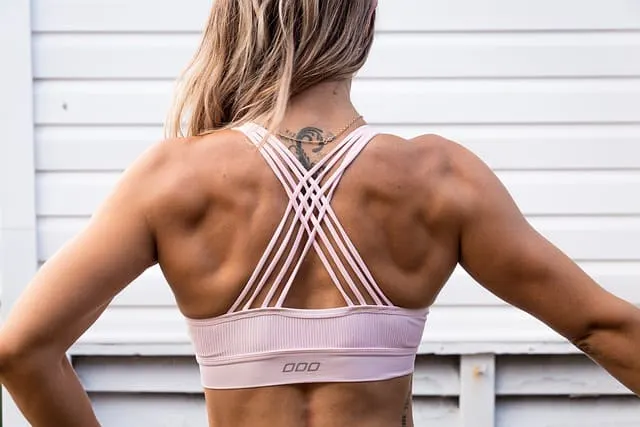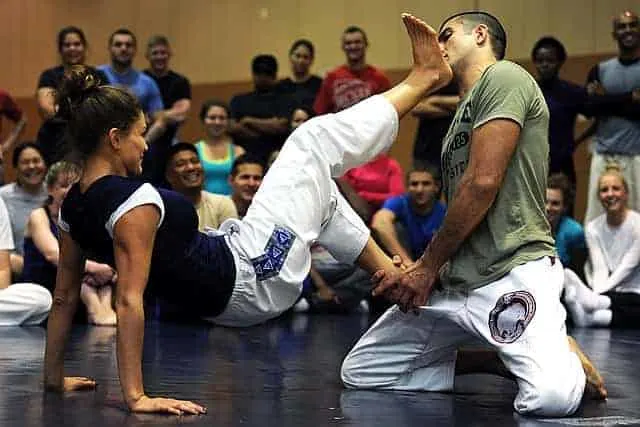
Editor’s note: The views and opinions expressed below are those of the author and do not necessarily reflect the views of MMAChannel.com
As a woman, flick on the TV and you’ll likely see men wrestling, boxing, kickboxing and so on. The number of women in combat sports? Or the number of female matches that are as heavily televised, broadcasted and promoted? Not nearly to the same amount as men.
Martial arts are male-dominated sports, and it’s a real shame. There are myriad benefits of training and competing in a combat sport that could benefit women both individually and collectively. It makes you physically and mentally stronger. It trains resilience, determination and commitment.
And best of all, you may become a role model to younger women, showing them what it’s like to embody strength, courage, and a fierce intelligence.
While most martial arts will give you a chance to punch, kick and fight, we believe that Brazilian jiu-jitsu confers a number of unique benefits among the martial arts.
With that, we explore the top 10 Most Compelling Reasons why women should train in Brazilian Jiu-Jitsu below.
10) Brazilian Jiu-jitsu Is Battle Tested
If you threw all the different types of martial arts together, which would come out on top?
This was a question that the Gracie family wanted to answer after they learned jiu-jitsu from Mitsuyo Maeda, a Japanese master who was visiting Brazil. The Gracie family is credited with not only developing Brazilian jiu-jitsu into the form we practice today, but in subsequent generations, the Gracies also brought no-holds-barred combat matches to America.
They wanted to see if their unique fighting style held up among the venerated traditions of kung fu, kickboxing and karate, to name a few. So, they created the platform we know today as Ultimate Fighting Championship (UFC) to pit the best of the best against each other. In these early days, the Gracie’s Brazilian jiu-jitsu was always the winner.
As you may imagine, those early matches were huge wins for crafting the reputation Brazilian jiu-jitsu enjoys today: fierce, competitive and effective. Today, all mixed martial art fighters use jiu-jitsu as the basis of their training and fighting.
If you’re interested in competing in your martial art, Brazilian jiu-jitsu is the proven winner among them all.
9) You’ll Never Strike, Punch or Kick!
While there is therapeutic value in kicking and punching, when it comes to martial arts, these techniques are sinkholes that eat up your energy. Take for instance the jiu-jitsu technique of a rear-naked choke. It doesn’t look nearly as elaborate as a taekwondo roundhouse kick, but it can render your opponent unconscious within seconds. Brazilian jiu-jitsu techniques are far more efficient uses of strength than any strike.

For many beginners, coming into a new sport with a pre-existing injury or condition is common. An experienced teacher will be able to guide you into the techniques without aggravating your injury. In many cases, starting every session with drills and a good warm up may even help you strengthen weaknesses and improve upon old injuries.
Most importantly, your teacher should explain appropriate communication with you and your sparring partners to never push you to the point of injury. Because its techniques are designed for submission, experienced jiu-jitsu practitioners tend to minimize injury to themselves and their partners. A sparring match ends when a fighter submits, and you don’t need to hurt your opponent to get a submission.
8) You’ll Gain Flexibility And Mobility
Flexibility is a prerequisite of mobility. Consider flexibility the amount of movement you have if someone were to move your body for you, like a puppet. Mobility is the amount of movement you have when you move your own body. You need flexibility before you can build mobility. In very general terms, women tend to be more flexible than mobile (and of course, there are always exceptions to this generality).
Brazilian jiu-jitsu is one of the few sports that will improve mobility. Many grappling positions require a large degree of flexibility, whether your legs are splayed apart, or your arms are wrapped under you. To outmaneuver your opponent, you’ll learn to own your flexibility. No matter what stretched-out position you may end up in, you need to tense your muscles in order to execute the correct countering technique.
With consistent practice, improvements in mobility pay back long term by creating health in the joints, strength at all ranges of motion and decreased chances of injury in other areas of your life.
7) You’ll Stay In Shape
To put it plainly, Brazilian jiu-jitsu is a killer full body workout. Sparring with an opponent for even 5 minutes can leave you as winded as the toughest cardio workout. In fact, some calculations have estimated a 700 calorie burn in a single session of jiu-jitsu (this can vary with body size and weight, as well as what you do in the class).

By leveraging and angling your body, you’ll access muscles you never knew you had, gaining strength and stability in your entire body.
For those with a competitive edge, Brazilian jiu-jitsu is an incredible motivation to get you up and moving. Besides drills and warm ups, much of your class will be involved in using techniques against a partner, or openly sparring. Your inner competitive fighter will love the wins and be motivated by the losses to consistently improve. Plus, it’s so much more fun than an hour on the treadmill!
If you’re looking to lose weight, gain muscle, improve your cardiovascular health, or simply stay in shape, Brazilian jiu-jitsu delivers.
6) It’s A Big Confidence Boost
All exercise tends to boost confidence due to gains in strength and endurance, take for instance the confident stance of a gymnast over your typical hunched-over desk jockey. But beyond simply feeling good in your body, martial arts provides a unique mental resilience training.
It literally knocks you down, and you learn to get back up. Again, and again. With dedication and practice, you might even win some of your sparring matches. The confidence you gain from a win is immense: a deep sense of accomplishment, pride and trust within yourself.
For these reasons, many families enroll kids into martial arts to develop this mental resilience early in life. It’s never too late to get mentally stronger. No matter your age, it’s incredibly empowering to feel like you can take whatever life throws your way and bounce back stronger.
5) Community
In a world more and more connected to screens, we grow less and less connected to each other. It should come as no surprise that rates of mental illness are rising in most first-world countries, with women at a higher risk of depression and anxiety than men. It’s well known in the scientific literature that isolation and social withdrawal are common signs of depression, and continuing to isolate oneself can worsen existing mental illness.
Can a fitness class really help combat an issue as serious as depression? While we are not prescribing exercise as the only treatment, martial arts can help you feel more connected to the people around you…literally!
Like any contact sport, Brazilian jiu-jitsu is all about communication and appropriate touch. You grapple with men and women in your class. You practice techniques on each other’s bodies and allow others to practice theirs. You learn about amounts of pressure, areas to apply it, and how to protect your partner as well as yourself from injury during training.
For women, learning to communicate physical boundaries in a safe, cooperative space can be paradigm-shifting. You’ll learn that voicing your boundaries does not make you weaker, shameful or cowardly. Instead, you’ll be a part of a community built on respecting boundaries and open communication–and it’s pretty safe to say we need so much more of this in the world.
There’s no substitute for the sense of community you’ll build when shedding blood, sweat and tears together. In other words, you’ll build your tribe here. And they’ll have your back.
4) Self Defense
It may come as a shock, but very few martial arts can teach you to defend yourself in real life. Karate, Taekwon-Do and Aikido, to name a few, are derived from rich cultural traditions of combat that do not hold up well to modern-day fighting.
If you’re considering taking a self-defense class at your local community center, many of which are quick 2-day training sessions, Brazilian jiu-jitsu is arguably the more effective alternative.
It doesn’t take a far stretch of the imagination to conceive of being pinned down by someone larger and stronger than you. How would you escape a hold like that, much less put up a punch or kick that might deter the attacker?
This is the puzzle jiu-jitsu helps you figure out. Jiu-jitsu fighters win their fights on the floor, using leveraging techniques to evade their opponent and gain the upper hand. Techniques like armbars, closed guard and rear-naked choke are not about strength or size, but correct technique. With dedicated practice, students can learn to defeat a larger opponent in real life.
It is important to point out that self defense and martial arts are not the same thing. While Brazilian jiu-jitsu will give you a very good basis to defend yourself, it’s still important to de-escalate a potentially dangerous situation and call for help. And if a situation does rise to the level of physical violence or weapons, a few lessons in any martial art or self defense may not be enough.
At the end of the day, you can be armed with the best self-defense training in the world and still be taken down by a weapon. Be aware of your surroundings, read body language and take avoidance action first and foremost.
3) Calm Under Duress
We’ve already mentioned the confidence and resilience you’ll gain by training Brazilian jiu-jitsu. Another huge psychological tool you’ll learn is how to stay calm and present even under difficult situations. Brazilian jiu-jitsu techniques rely on fluidity and technique, neither of which would work should you panic, freeze or tense your entire body.
With repeated sparring matches, fighters strive to move as naturally as possible, flowing through movements without falling into a strong emotion, whether it’s frustration, fiery anger or even panic. When those strong emotions take over, fighters tend to force their way through the fight, maybe even forgetting their technique.
It’s critically important to stay cool under pressure, so fighters practice this over and over. In fact, many sparring matches start with one fighter at a disadvantage so that he or she can learn to deal with danger without losing their cool.
Of course, this is a tool of mental resilience that will reap benefits out of the fighting arena. Can you imagine keeping your head straight when your boss yells at you for a slip up? Or your spouse or partner pushes your buttons? Or worse yet, if you were in a physical confrontation and had to defend yourself? By keeping that calm, collected mind, you will be able to navigate these life situations more gracefully.
2) Does Not Rely On Strength, But Will Make You Stronger
Most would consider Brazilian jiu-jitsu a game of brawn over brains. After all, how can your intelligence matter when your opponent is double your size?
This however is not the case.
Each sparring match is more like a game of human chess than a fist fight–to get out of a complex hold, you’ll need to know how to leverage body weight and momentum to escape. In fact, the legendary Royce Gracie of the founding Brazilian jiu-jitsu family used to beat fighters who outweighed him by a hundred pounds or more.
Being a good fighter is a combination of problem-solving, cunning and of course, technique. You don’t have to be big and heavy to succeed at this sport.
All that aside, if you train consistently you will still see gains in strength and power. The unique advantage of Brazilian jiu-jitsu is that strength and power is equally combined with problem solving skills and cleverness.
1) Empower Yourself, And Other Women
In a modern culture filled with Me Too scandals and political discussions around consent, the issue of self defense goes far beyond the physical. Women need to know that they can say “no” at any time for any reason, and not feel ashamed for it. There needs to be a shift in the cultural paradigm where the word “no” is respected and taken seriously.

Should a woman be attacked, they need to be able to read signs of threatening situations before they happen and have techniques to avoid them. And should a situation become physically dangerous, women need to have the knowledge and will to protect themselves in body and mind.
Unfortunately, our culture does not empower women to stand up for themselves. Even as far as we have come today, women are still commonly stereotyped as homemakers and caregivers, grouped together with vulnerable children or fragile elderly. In order for our society to move forward, we need to teach, cultivate and celebrate the women who step into their strength as capable, resilient and physically able.
Here’s where Brazilian jiu-jitsu may be able to serve you better than perhaps any other sport. Yes, you’ll learn how to fight. But the real benefits come from years-long labors of consistency and repetition. You’ll learn how to not give up by showing up every single session and getting knocked down. A lot. You’ll practice how it feels to be physically strong, then stronger, regardless of your size, shape and weight. You’ll practice facing a potential danger and overcoming fear. You’ll learn the depth of your true resilience.
In a society full of sex symbols, or motherly stereotypes, or damsels in distress, women rarely see other women in positions of power, wisdom and physical strength. By choosing to train in Jiujitsu, you will begin to embody the tenacious, intelligent and powerful side of yourself that you may have never had the opportunity to explore.
Seeing women in martial arts gives younger generations a role model: someone to admire and aspire to be. When we surround young women with models of power, strength and intelligence, we can start to shift how women are perceived in society. We change the discussion from what we look like to what our incredible bodies can do (and we don’t mean chores and childbearing).
It may seem like a small step, but it is a push forward into celebrating the strength and resilience of women, and it’s a valuable place to start. When we are able to see women as who they are, not a smaller version of a man, we will finally be able to shift the values we associate with women.
